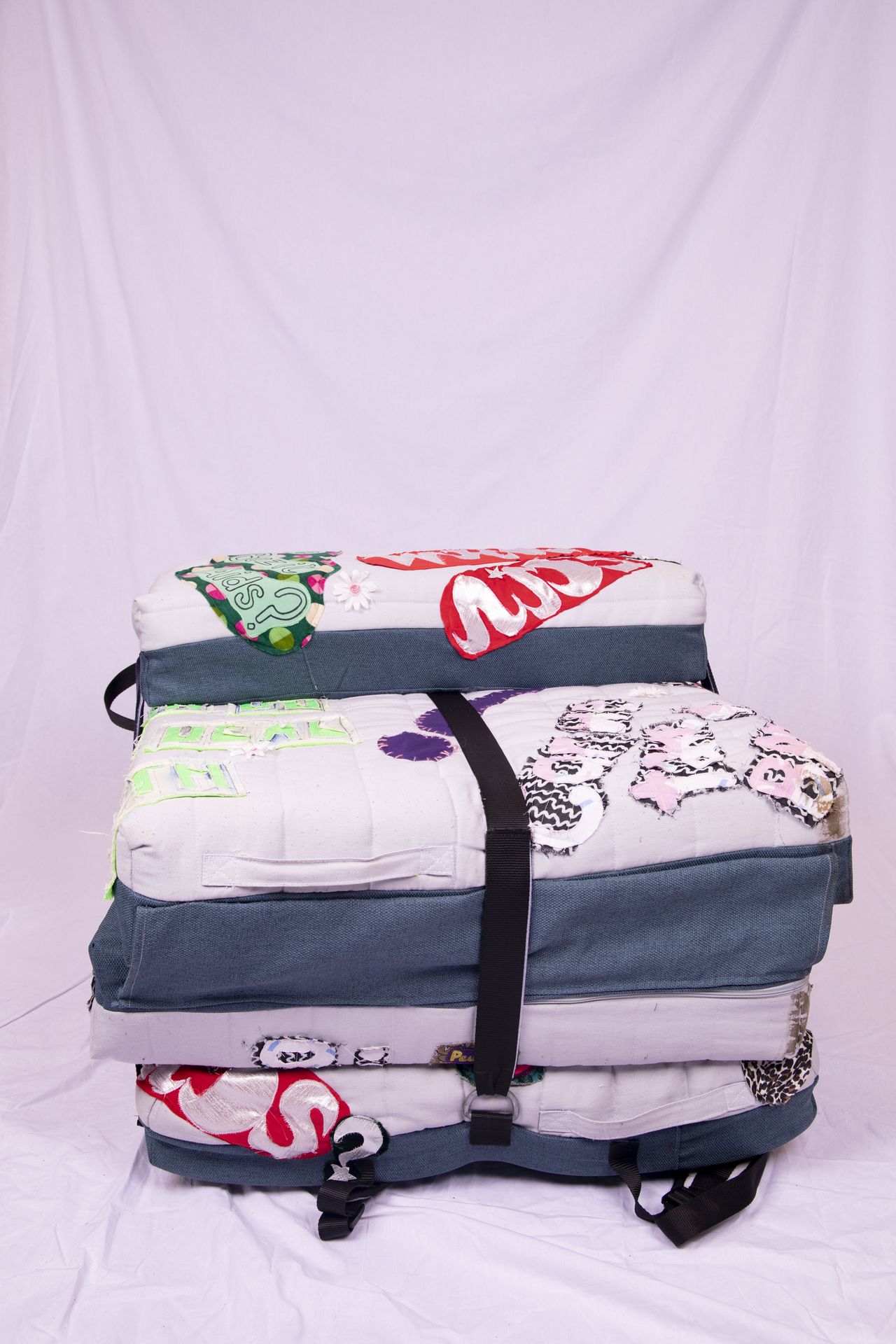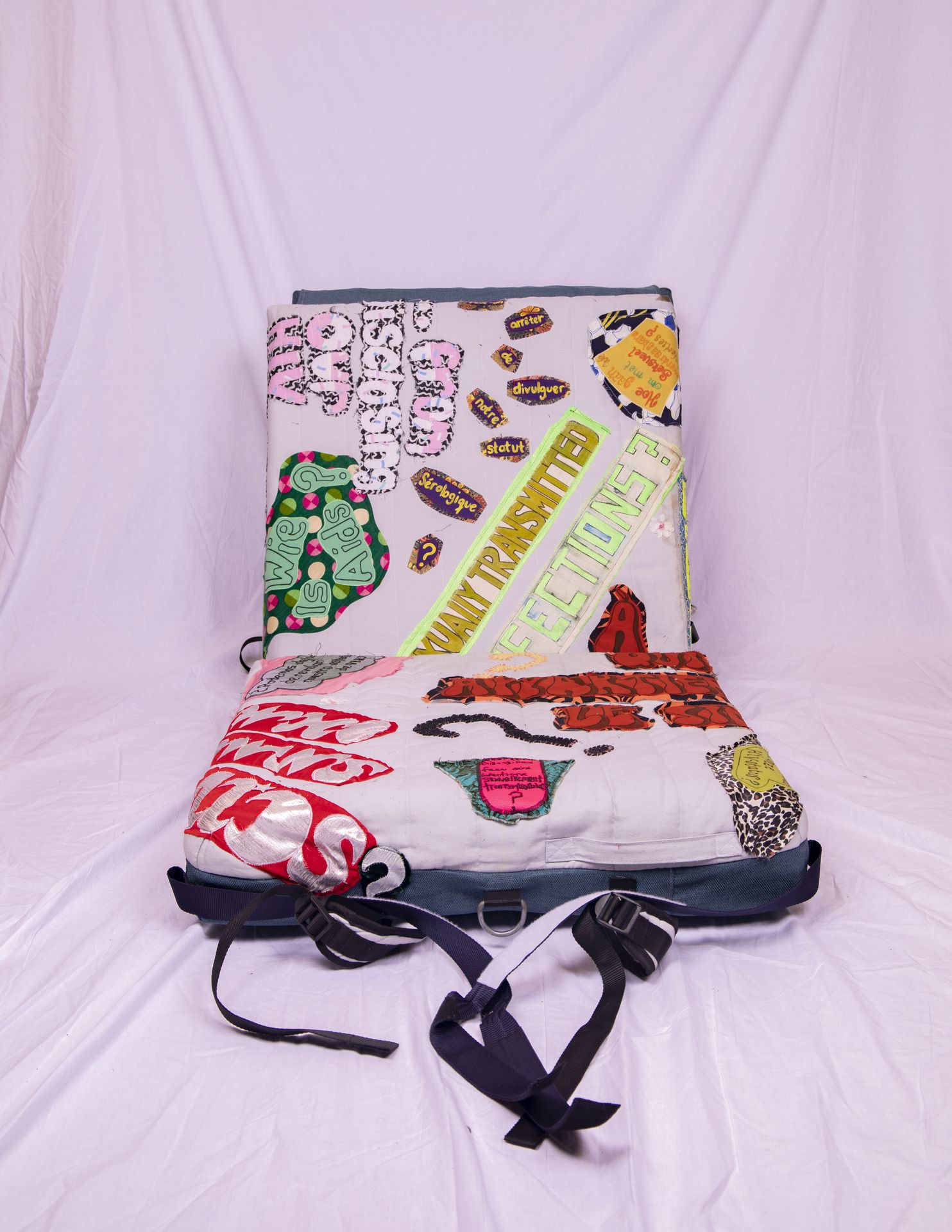This past December, a project I was working on ended. The Aids Archives and Arts Assemblies in Belgium Project was a two year project aimed to host two intimate assemblies for and by people living with HIV, concerned with HIV and aids, and those impacted by serophobia. As you may have read in the past, the project has been an anchor in my career in many ways. I learned a lot from my two co directors and from many of the participants who in one way or another made this project what it was.
Through this project, there was a sculpture made that we called the aids sofa; it was later named Nous avons besoin de parler / We Need To Talk after the public event at Kaaistudios in December 2023. The story goes something like this:
The context in which the work was created :
Nous avons besoin de parler was created as part of the project Aids Archives and Arts Assemblies in Belgium as a tool for reflection around rest and the aids, following the desire to rest expressed by participants in the project's first assembly in July 2023. We explained the project governance process that led to the creation of the work in the essay "What Isn't Governable", published in the arts research journal Tools # 0, edited by Marnie Slater and published by Sint Lucas Antwerpen in 2023:
« Our project is to host three intimate and self-organized assemblies in 2023, ’24, and ’25 between chosen diversities of people concerned with HIV and aids. Whose aids?
« The assemblies, with their self-contained audience, are our artwork of choice, where we share inter-community knowledge, where we choose to integrate administrative and artistic practices. In a travesty of structures used by Belgian non-profit organizations, which we aren’t, we use assemblies as one of the project’s self-governing bodies, modulated by community trust.
« Consequently, the 2023 assembly group of five people initially took on a mandate to “define the conditions for the hosting of an assembly in 2024.” Understanding that the group most wished for the 2024 assembly to be, we renamed the mandate into making a list of desires for the hosting of an assembly in 2024.
« In three one-hour sessions, spread over two days nearing the end date of the five-day assembly, we 1) presented the overall structure of “Aids, archives, and arts…,” 2) brainstormed desires, and 3) wrote down the desires of each participant on a very large sheet of paper. Those who were newer to the project took extra time to brainstorm between them in the absence of the direction team. The writing session had one conductor and one writer; the latter decided to color-code the desires into categories: space, people… The pressure of making choices and the fatigue made it hard both to conduct and to contribute to the list during the third session. Lastly, 4) we encircled the desires we most cherished to come up with a “list of core desires;” desires that speak of the conflicts and frictions they act upon.
« A List of Desires is the tool I want to bring to this publication. As a direction team, we admin, we produce, and we make choices depending on opportunities as they come along. From now onward and until a next list is written, we follow this list to a) build community trust and b) limit overtime. Resting in transition is our style of choice to (self-)govern what isn’t governable. Whose aids today? Whose tomorrow?
« Last month, when coming upon the opportunity of issuing a publication before the end of the year, we decided to publish a sofa, answering to a desire from our list for “Space of rest.” Today more than ever. »
Work creation process:
Following the assembly at BUDA Kunstencentrum in Kortrijk in 2023, the organization and art archive Visual AIDS in New York proposed that we write a publication for their site. Due to a lack of budget at Visual AIDS, this collaboration didn't take place in the end.
We decided to go ahead with our publication project. The publication would be a sofa bed, instead of an article. This sofa bed, inspired by the design of the sofas at BUDA Kunstencemtrum, is intended to serve as a tool for talking about Sidas and rest, in response to the desire for rest expressed by the participants at the meeting.
The sofa bed publishing team was made up of artists working with or about HIV and the aids:
aAliy A. Muhammad: poet, visual artist and activist living in Philadelphia, member of the collective What Would An HIV Doula Do? in New York ;
Emmanuel Cortés: visual artist working mainly with textiles, living in Brussels;
Héloïse: astrologer, writer and radio designer living in Brussels;
nixie: visual artist and performer living in Ghent;
Oscar Mathieu le Bussy: visual artist and writer living in Brussels;
Raphael Kalengyagi Junior: writer and filmmaker living in Brussels;
And others who wish to remain anonymous.
The creation of the sofa was accompanied by the management team of Aids Archives and Arts Assemblies in Belgium composed by me and :
Castillo: artist, writer, performer and arts researcher living in Brussels, member of the Buenos Tiempos collective, Int. in Brussels ;
Talya: artist living in Paris.
The questions designed for the project were inspired by documents available on the website of the What Would An HIV Doula Do? collective (https://hivdoula.work/), of which aAliy A. Muhammad is a member. The following questions were sewn onto the sofa by hand or machine:
How do we deal with infections?
¿Cómo nos enfrentamos a las infecciones?
Comment faisons-nous face aux infections ?
Hoe gaan we om met infecties?
Whose aids? Who owns aids?
À qui appartient le sida ? Qui est propriétaire du sida ?
¿A quién pertenece el sida?
Van wie is aids? / Wie bezit AIDS?
Can we take a break from disclosing our HIV status?
Peut-on arrêter de divulguer notre statut sérologique ?
¿Podemos dejar de revelar nuestro estatus de VIH?
Mogen we stoppen met het bekendmaken van onze hiv-status?
Following teamwork and the creation of the sofa bed. It was activated for the first time as part of the public program Whose Aids? organized by Aids Archives and Arts Assemblies in Belgium at the Kaaistudios in Brussels on December 14, 2023 :
“We need to talk” is the recording of a discussion on aids and rest between Emmanuel Cortés, Héloïse, nixie, and Raphaël Kalengayi Junior, who will enter into dialogue with a small audience. This recording starts with a couch, which then serves as a conversation starter about aids and rest, because we need to talk.” (https://kaaitheater.be/fr/agenda/23-24/qui-appartiennent-les-sidas)
Subsequently, on April 22, 2024, the recording of the conversation was broadcast on the Brussels-based free and associative radio station Radio Panik (https://www.radiopanik.org/emissions/plein-la-tete-pour-pas-un-rond/we-need-to-talk/).
Artwork description:
The work is a handmade foam sofa bed for one person, covered with fabric and applied text. The sofa-bed can be folded to be used as a chair and transported using the straps underneath. Unfolded, the sofa becomes a single bed. There are additional straps to use when folded to retain its structure.
The sofa bed was created to facilitate conversations about the experiences of HIV and aids. The text sewn onto the surface consists of several questions in four different languages. These questions and the sofa bed serve as a starting point for conversations about rest, stigma and appropriation, and are intended to give space for different realities to be explored in conversation and in different situations.
This sofa bed has been sewn mainly by hand and with reused materials. The sofa-bed is intended to be used for and by people affected by HIV and Sidas, people who have experienced serophobia and people working in the field of HIV and aids. The sofa has been designed to be mobile, hosted by cultural, social or artistic institutions where it can be used by the public. The aim is for the sofa-bed to be a conversation starter, not just an object to be admired.
In the future, the sofa is scheduled to tour various associations and cultural institutions, particularly those focusing on queer and HIV-positive discourses. The concept involves lending the sofa to interested organizations for a given period, facilitating discussions on queer identity, arts and culture in relation to the Sidas. This initiative opens up avenues for revisiting questions on the sofa bed with different artists and groups, encouraging ongoing dialogue and exploration.
This sofa is now part of the Province of Namur collection. Our beloved aids sofa made its rounds in 2024 across Belgium, mainly in events around Brussels, but also in Kortrijk, and Gent. Some of the hosts include, in no particular order: Viernulvier, Les Grands Carmes, BUDA Kunstencentrum, Kaaistudios, and PACO.
The sale of the sofa was a bit contentious, as having a piece of our project in a museum was never our intention. We managed to convince the purchasing committee to buy a multi author piece, in hopes that we could also activate the sofa after the sale. Our aim is to have discussions with the DELTA’s arts programs director to have the sofa live and not simply be put in storage until it is exhibited. We’d like to also ask that they program a residency for artists living with HIV. This however is a whole lot of negotiation with a project that has ended. So these things are left floating for now. The sofa is in Namur. The desire to keep activating it is still present.
The work I am developing around my novel has been fully inspired by how this sofa was conceived, how it was activated, and by the feedback I’ve gotten from the process of using the sofa as a device to help start conversations. So I hope that I can bring it full circle and come back to the negotiations with Le DELTA about this sofa. This is to be revisited.
That’s all for now.
img credit for three images below: Louka Perderizet


